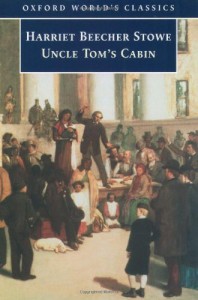 Uncle Tom’s Cabin was first published in 1851 in an abolitionist periodical in response to the second Fugitive Slave act which made it illegal to aide runaway slaves.
Uncle Tom’s Cabin was first published in 1851 in an abolitionist periodical in response to the second Fugitive Slave act which made it illegal to aide runaway slaves.It is a very powerful novel and must have been incredibly influential during its day.
Stowe wrote with a furious passion, putting everything she thought and believed into this book. She occasionally diverted off into little rants, at first inventing contrived situations where characters or bits of passing dialogue were used purely to deride the slave trade. Towards the end she dispensed with creating characters and went on to simply lecturing the reader.
If you take the story away from the context and purpose you end up with something that isn’t very well written when you compare it to the likes of Dickens or Austen. The plot is rather loose and floating, feeling rather unplanned and the ending is weak.
From a non-religious perspective also, there was a lot of religious preaching which does not usually bother me, but this was just too much at times. I did not mind the characters when they were praying or talking about the bible, but Stowe fell into giving her own preaching.
However, put it back into context and what you do have is a very strong novel that must have stirred up a few hearts. She appealed to the fact that – you could not possibly be a real Christian, unless you were against slavery. If you owned slaves, traded in them or any way your soul was somehow at risk.
She criticised people who used used religion to justify slavery but she also believed that it is not enough to free slaves out of Christian duty, but you also have no prejudice against them at the same time.
From a modern day, non-religious perspective I found the preaching a lot to get through, but if you put it into the context it would have been appropriate for the audience she was writing for. The book was not written just to tell a story, it’s purpose was more far reaching.
Stowe does not shy away from informing the reader in not so many words, the way slaves were treated. Although for the most part she doesn’t actually show a lot of the brutality and most of the slave owners you meet in the book were the good kind. You heard through stories told by the characters about their histories and experiences.
The characters were all, mostly interesting and I enjoyed much of the dialogue which felt very realistic and natural. None of them were particularly fleshed out apart from Augustine St Clare who became my favourite.
There were two stories – the main being about Uncle Tom, who submitted to being sold down south due to the financial difficulties of his previous kind master. The secondary about Eliza and George who instead of relying on fate, took it into their own hands and fled.
Uncle Tom became a symbol of the strength of your faith in God. In modern times he has become a negative stereotype for giving into white men without a fight. I don’t think this is strictly fair, he did not physically fight against his masters, twice because he did not have to – but he did not give in emotionally or spiritually. Eliza and George played the other half – the slaves who disobeyed to flee to Canada. Although both sides showed that Christianity would in the end free them.
Stowe of course would have met and spoken and heard of such stories first hand and put them into this book. I believe both Eliza and Uncle Tom were based on real people. So in a way it is hard to try to compare this to other classical novels, it feels much more a piece of propaganda..
I only gave this book three and a half stars because I felt that it did not capture my attention or imagination very well. Situations, conversations and characters felt contrived merely to put her point across. I am however a modern day reader – and I judge it from this perspective. I think it has become dated, but an important book of it’s time.


